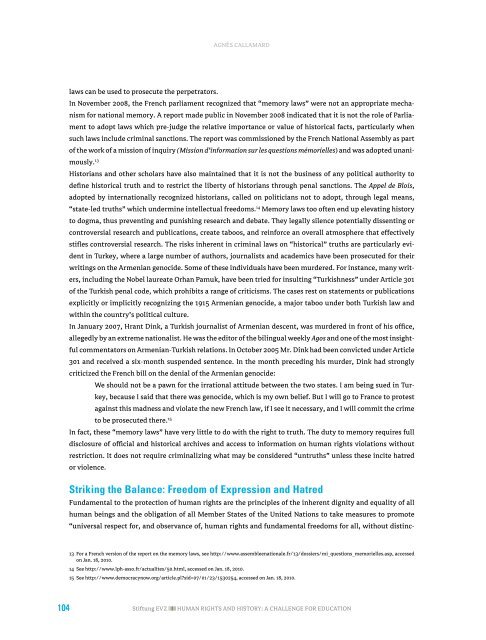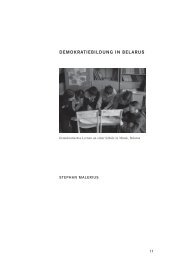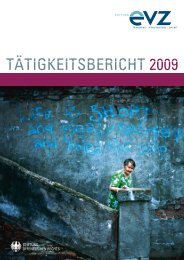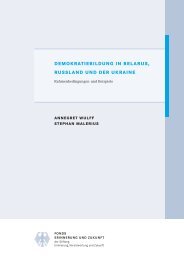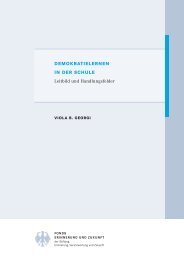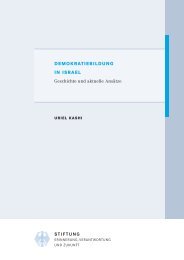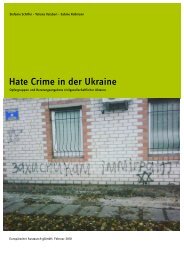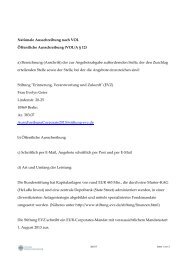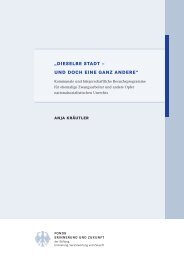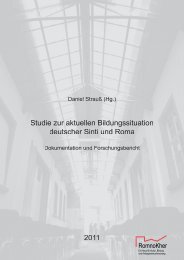chapter 2 - Stiftung "Erinnerung, Verantwortung und Zukunft"
chapter 2 - Stiftung "Erinnerung, Verantwortung und Zukunft"
chapter 2 - Stiftung "Erinnerung, Verantwortung und Zukunft"
Create successful ePaper yourself
Turn your PDF publications into a flip-book with our unique Google optimized e-Paper software.
Agnès Callamard<br />
laws can be used to prosecute the perpetrators.<br />
In November 2008, the French parliament recognized that “memory laws” were not an appropriate mechanism<br />
for national memory. A report made public in November 2008 indicated that it is not the role of Parliament<br />
to adopt laws which pre-judge the relative importance or value of historical facts, particularly when<br />
such laws include criminal sanctions. The report was commissioned by the French National Assembly as part<br />
of the work of a mission of inquiry (Mission d’information sur les questions mémorielles) and was adopted unanimously.<br />
13<br />
Historians and other scholars have also maintained that it is not the business of any political authority to<br />
define historical truth and to restrict the liberty of historians through penal sanctions. The Appel de Blois,<br />
adopted by internationally recognized historians, called on politicians not to adopt, through legal means,<br />
“state-led truths” which <strong>und</strong>ermine intellectual freedoms. 14 Memory laws too often end up elevating history<br />
to dogma, thus preventing and punishing research and debate. They legally silence potentially dissenting or<br />
controversial research and publications, create taboos, and reinforce an overall atmosphere that effectively<br />
stifles controversial research. The risks inherent in criminal laws on “historical” truths are particularly evident<br />
in Turkey, where a large number of authors, journalists and academics have been prosecuted for their<br />
writings on the Armenian genocide. Some of these individuals have been murdered. For instance, many writers,<br />
including the Nobel laureate Orhan Pamuk, have been tried for insulting “Turkishness” <strong>und</strong>er Article 301<br />
of the Turkish penal code, which prohibits a range of criticisms. The cases rest on statements or publications<br />
explicitly or implicitly recognizing the 1915 Armenian genocide, a major taboo <strong>und</strong>er both Turkish law and<br />
within the country’s political culture.<br />
In January 2007, Hrant Dink, a Turkish journalist of Armenian descent, was murdered in front of his office,<br />
allegedly by an extreme nationalist. He was the editor of the bilingual weekly Agos and one of the most insightful<br />
commentators on Armenian-Turkish relations. In October 2005 Mr. Dink had been convicted <strong>und</strong>er Article<br />
301 and received a six-month suspended sentence. In the month preceding his murder, Dink had strongly<br />
criticized the French bill on the denial of the Armenian genocide:<br />
We should not be a pawn for the irrational attitude between the two states. I am being sued in Turkey,<br />
because I said that there was genocide, which is my own belief. But I will go to France to protest<br />
against this madness and violate the new French law, if I see it necessary, and I will commit the crime<br />
to be prosecuted there. 15<br />
In fact, these “memory laws” have very little to do with the right to truth. The duty to memory requires full<br />
disclosure of official and historical archives and access to information on human rights violations without<br />
restriction. It does not require criminalizing what may be considered “untruths” unless these incite hatred<br />
or violence.<br />
Striking the Balance: Freedom of Expression and Hatred<br />
F<strong>und</strong>amental to the protection of human rights are the principles of the inherent dignity and equality of all<br />
human beings and the obligation of all Member States of the United Nations to take measures to promote<br />
“universal respect for, and observance of, human rights and f<strong>und</strong>amental freedoms for all, without distinc-<br />
13 For a French version of the report on the memory laws, see http://www.assembleenationale.fr/13/dossiers/mi_questions_memorielles.asp, accessed<br />
on Jan. 18, 2010.<br />
14 See http://www.lph-asso.fr/actualites/50.html, accessed on Jan. 18, 2010.<br />
15 See http://www.democracynow.org/article.pl?sid=07/01/23/1530254, accessed on Jan. 18, 2010.<br />
104<br />
<strong>Stiftung</strong> EVZ<br />
HUMAN RIGHTS AND HISTORY: A CHALLENGE FOR EDUCATION


